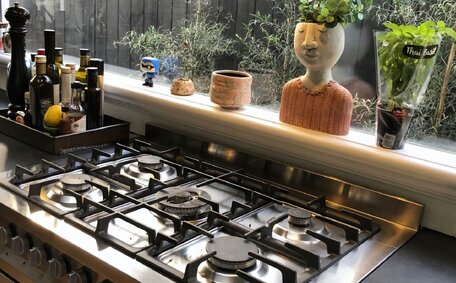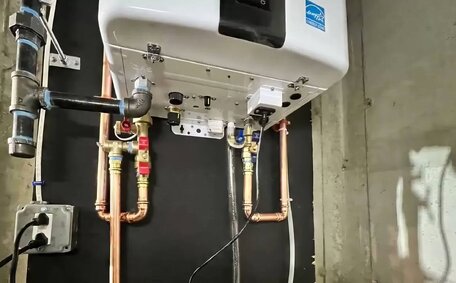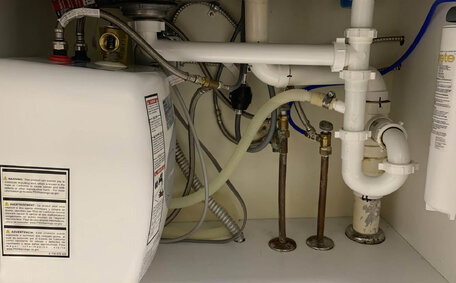Introduction to using baking soda and vinegar for cleaning
Many believe baking soda and vinegar combine to create an effective DIY cleaning solution. When mixed, these pantry essentials produce a bubbling reaction, which many interpret as indicative of a powerful cleaning agent. However, the fizzing is simply a byproduct of a chemical reaction that reduces the cleaning effectiveness of both substances.
Although the mixture may dislodge some dirt and grime, baking soda and vinegar clean more effectively when applied independently. the emerging bubbles are deceiving, as the sodium acetate, water, and carbon dioxide produced offer minimal cleaning ability.
Nonetheless, used singly, both baking soda and vinegar boast effective natural cleaning properties. In this article, we’ll break down the chemistry behind these common pantry ingredients and provide tips for harnessing their individual cleaning abilities - especially when tackling plumbing issues.
The chemical reaction between baking soda and vinegar
A chemical reaction ensues when you mix baking soda (sodium bicarbonate) with vinegar (acetic acid). This reaction happens in two steps:
- Acetic acid from vinegar interacts with sodium bicarbonate, forming unstable carbonic acid.
- This carbonic acid quickly decomposes into carbon dioxide and water, with the swift emergence of gas bubbles producing the fizzy reaction seen in the vinegar cleaning mix.
So in summary:
Vinegar (acetic acid) + Baking Soda (sodium bicarbonate) → Carbonic acid → Carbon dioxide gas + Water + Sodium acetate
In the end, all that remains is water, carbon dioxide, and trace amounts of sodium acetate. Sodium acetate is a type of salt that serves as a baking soda base. This mixture doesn’t have substantial cleaning properties since the original acid and soda can help cancel each other out.
While the bubbles from one cup baking soda and vinegar look promising, they are mostly just water and carbon dioxide gas. The sodium acetate, akin to a kind of salt water, left behind in solution has very little cleaning power. So despite the exciting reaction, combining vinegar and baking soda provides no special benefit.
Does the fizzing reaction actually clean?
From observation, it’s clear that despite its notability, the fizzing reaction between baking soda and vinegar possesses limited cleaning efficacy. As indicated previously, the reaction between vinegar and baking soda neutralises the respective acidic and basic qualities of these ingredients. The reaction predominantly yields water, carbon dioxide bubbles, and a salt known as sodium acetate.
Sodium acetate lacks robust cleaning properties. The bubbly mixture cleans mainly through the mechanical action of the fizzing and not through the action baking soda can exert on its own. However, this mixture is no more effective than using either baking soda or vinegar independently.
Research shows that using vinegar on its own cuts through grease and dissolves grime more effectively than the effervescent mixture. Indeed, employing extra vinegar can penetrate and cleanse more efficiently, providing ample cleaning prowess.
The primary benefit of the baking soda and vinegar reaction is the visual spectacle of the dramatic fizzing. Assessing the true impact of these potent cleaners on dirt, grease, and grime removal reveals they’re typically no more effective than when used individually. These two ingredients work better solo than combined.
Nevertheless, if the effervescent reaction intrigues you, feel free to experiment with the mix, keeping in mind its actual cleaning limitations. The secret lies in appreciating and utilising the benefits of each substance on its own.
Using baking soda and vinegar separately
While baking soda and vinegar are highly reactive when combined, they each have their own cleaning strengths when used separately:
Vinegar
Distilled white vinegar, with its lower pH, acts as a mild acid known for its impressive cleaning abilities; it slices through grease, dissolves mineral accumulation, banishes stains, and sanitises surfaces. The acetic acid in vinegar provides antibacterial properties, particularly beneficial in the laundry process.
Furthermore, vinegar’s versatility lends itself to various cleaning applications around the house:
- Combine vinegar with water to concoct a potent all-purpose cleaner with balanced pH. Spray this vinegar solution onto countertops, windows, mirrors, and a variety of surfaces. This solution proves efficient at tackling soap scum in bathrooms.
- Use undiluted vinegar on recalcitrant mineral deposits on stainless steel fixtures or around taps and sinks for dissolving calcium buildup. Soak a paper towel in vinegar, apply to the troublesome area, and allow it to sit briefly, aiding the dissolution process.
- Add a cup of white vinegar to your washing machine’s laundry load as a fabric softener that also helps remove stains.
- Combine equal parts of vinegar with baking soda and pour down the drain to ease blockages and slice through grease build-up.
Baking Soda
Baking soda acts as a mild base and a light abrasive, efficiently removing dirt and residues as a scrubbing agent. Its granular texture aids in scouring away grime with little effort.
Here are some applications for baking soda as a household cleaner:
- Liberally spread baking soda on stove surfaces to combat oily residues and tenacious grime.
- Apply a baking soda paste to greasy sections and use a stiff brush for an efficient cleaning approach.
- Enhance your usual laundry detergent with a cup of baking soda to boost its effectiveness against persistent food stains.
- Create a baking soda solution by mixing 2 tablespoons of baking soda with 1 litre of warm water, perfect for cleansing walls and ceilings of smoke, dirt, and marks.
While fun to watch, combining vinegar and baking soda is less effective as an oven cleaner compared to using the ingredients separately. However, used solo, baking soda vinegar can be extremely effective for natural cleaning and removing grime around your home.
Cleaning applications where baking soda and vinegar shine
While vinegar baking soda combinations generally neutralise each other, vinegar baking soda can have effective cleaning applications when used separately:
Due to its acetic acid content, vinegar works well for:
- Disinfecting and cleaning cutting boards, countertops, and your kitchen sink surfaces
- Descaling kettles and coffee makers to remove mineral buildup
- Unclogging a shower head by removing hard water stains
Thanks to its mildly abrasive texture, baking soda tackles:
- Grease and grime - use a paste baking soda to clean ovens, pans, and outdoor grill grates
- Clogged your drain and sinks when mixed with hot water, baking soda can help loosen the blockage
- Odours and stains - sprinkle on carpets, mattresses, and car interiors before vacuuming
While the chemical reaction between vinegar and baking soda may be underwhelming, they each bring something unique to the cleaning game. Focus on their individual strengths rather than combining them for best results.
When not to mix baking soda and vinegar
While the combination of baking soda and vinegar is generally harmless, there are a few situations where mixing these ingredients is not advisable:
Drain Cleaning
Pouring baking soda and vinegar down the toilet or bathroom drains may seem like a suitable DIY solution. However, the fizzing reaction could also inadvertently push the clog deeper into the pipes. It’s more effective to address clogs with boiling water, a drain snake, or by engaging a professional plumber.
Septic Systems
Homes on septic systems should avoid putting baking soda and vinegar down drains. The sodium acetate left behind after the reaction, while detrimental to beneficial bacteria in septic tanks, showcases that vinegar can help in other scenarios like breaking down waste.
Delicate Surfaces
The bubbles and fizz from mixing baking soda and vinegar could potentially harm more sensitive surfaces, such as natural stone countertops or flooring. Make sure to test cleaners on a small inconspicuous area first.
In most cleaning scenarios, using baking soda and vinegar separately is a better approach. But if you use baking soda vinegar without mixing together, be mindful that the initial fizzing reaction might have unintended consequences, especially for plumbing and drainage.
Alternative natural cleaning solutions
While baking soda and vinegar can be useful cleaners, there are also many other eco-friendly, natural cleaning solutions to consider:
Lemon Juice
The natural acidity of lemon juice slices through grease and stains, bypassing the need for harsh chemicals. Utilise pure lemon juice or mix it with vinegar or baking soda to amplify its cleaning efficacy.
Castile Soap
Opt for castile soap made from plant oils—an environmentally friendly option that addresses dirt and grime without releasing toxic fumes. Combine with water in a spray bottle to create an all-purpose, biodegradable cleaning solution.
Essential Oils
Oils such as tea tree, eucalyptus, and lemon offer natural antibacterial and deodorising qualities. Infuse a few drops into self-made spray cleaners or diffusers for a natural disinfectant.
Borax
This naturally occurring mineral has grease-cutting and odour removal properties without harsh bleach. Make a paste with water to scrub sinks, tiles and baths.
Experiment with green cleaning eco-conscious cleaners like these for a baking soda and vinegar alternative that’s sustainable and effective for household cleaning and plumbing needs.
Contact us for your plumbing needs
At Strathfield Plumbing, we offer a wide range of plumbing services to homes and businesses across Strathfield and greater Sydney. With over 15 years of experience, we are experts in everything from emergency plumbing to drain cleaning, leak detection, hot water system repair and gas fitting.
If you are located in the Strathfield area and have any plumbing issues - big or small - we encourage you to set up an appointment.
- Emergency plumbing available 24/7. Call 1300 349 338.
- Blocked drains and pipe cleaning.
- Water leak detection and repair.
- Hot water system installation and maintenance.
- Bathroom and kitchen renovations.
We also offer commercial plumbing services to cafes, restaurants, offices, warehouses and more.
Strathfield Plumbing provides top-notch customer service and competitive prices, covering all your plumbing needs. Contact us at 1300 349 338 or jobs@strathfieldplumbingservices.com.au to book an appointment.






